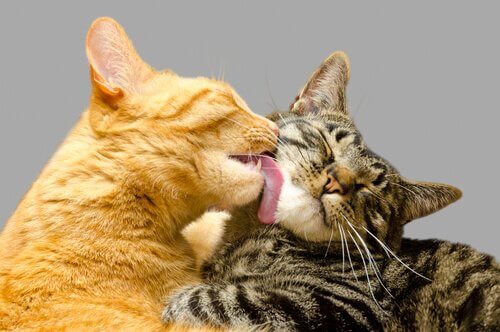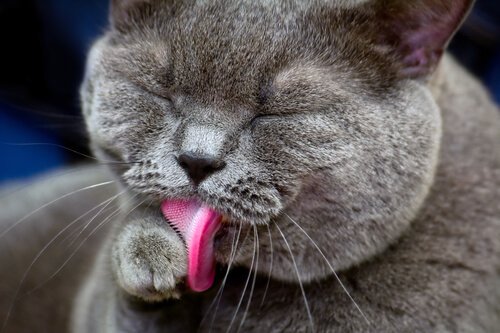Cats' Tongues and How They Use Them for Hygiene

Cat owners know that their pets are both fascinating and extremely hygienic. Cats have a strict daily hygiene routine that keeps their bodies free of dirt. In this article, we’ll explain why cats’ tongues play a central role in their cleanliness and health.
Why are cats’ tongues so rough?
We’ve probably all been amazed at how rough cats’ tongues are. This roughness is due to a layer of thorny tissue located on the surface of the tongue.
This tissue is formed by a set of conical papillae that are made of keratin—the same substance that’s found in cat’s hair and nails. Although its rough texture makes it feel like a file when they lick us, the conical papillae act like a comb or a brush that the cat uses to clean itself.

Hair removal
When a cat licks its fur, its ‘tongue brush’ removes dead hair and a lot of the dirt from the environment. This mechanism is essential in the wild since it prevents parasites and dirt from sticking to the animal’s skin and fur. Also, it keeps hairballs from forming in their fur.
The conical papillae on cats’ tongues also allow felines to ‘scrape’ the flesh that’s attached to the bones of their prey. In addition to making feeding easier, this prevents the cat from wasting its time hunting and having to spend more energy catching another food source a short time later.
Cats’ natural cleaning method and the danger of intestinal hairballs
A cat’s daily grooming habit isn’t just a positive thing for the animal, but it’s part of their routine and the way they are. Therefore, we cannot and should not forbid our cats from licking and cleaning themselves.
However, this natural grooming also carries a dangerous health risk: the formation of hairballs in their gastrointestinal tract.
Since the animal’s ‘tongue brush’ is so effective, the cat ends up ingesting a large amount of dead hairs. These hairs then enter the animal’s digestive tract. On top of that, they tend to accumulate in their stomach and intestine, forming hairballs.
How do I know if my cat has clogging hairballs?
Hairballs in a cat’s gastrointestinal tract can cause digestive disorders and severe cases of constipation. If your cat has clogging hairballs, he’ll probably have difficulty defecating or will have drier, darker and smaller stools.

Additionally, the cat will feel the need to get the hairball out of his gastrointestinal tract. Because of this, it will probably try to regurgitate or vomit. If their hairballs are more advanced, the cat may also be apathetic or lethargic, due to pain or digestive discomfort.
The following are symptoms of hairballs in cats:
- Frequent dry-heaving
- Vomiting (normally with food chunks and liquid)
- Regurgitation
- Constipation
- Dry, dark and smaller stools
- Rigid abdomen (may be accompanied by abdominal pain)
- Apathy or lethargic state
How to prevent hairballs from forming in cats
The best way to keep your cat from accumulating hairballs in his digestive tract is by brushing him regularly. In addition to brushing him regularly, it’s very important to choose the right brush to use on your cat’s fur.
If your cat has short hair, it’s best to use the classic cat combs you can find at the local store. Remember to choose soft bristles so you don’t hurt your cat. Remember, brushing him should be a pleasant experience for both of you.
On the other hand, if your cat has long, semi-long or dense hairs, you should get a metallic or two-sided brush. Traditional brushes and combs don’t reach the underneath fur of these cats, so using them won’t give you the results you want.
Also, you can give your cat catnip in moderation. This plant stimulates their senses and helps them have bowel movements. In this way, it keeps the hairs from accumulating in their gastrointestinal tract.
This text is provided for informational purposes only and does not replace consultation with a professional. If in doubt, consult your specialist.